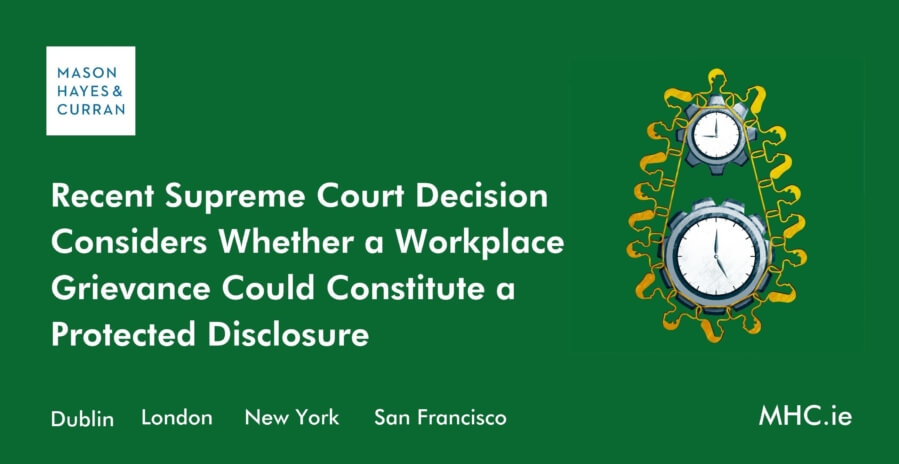Recent Supreme Court Decision Considers Whether a Workplace Grievance Could Constitute a Protected Disclosure

In Baranya v Rosderra Irish Meats Group Ltd, a butcher employed by the Respondent claimed that he had been dismissed for making protected disclosures related to health and safety in the workplace. After findings by the Workplace Relations Commission (WRC), Labour Court and High Court that he had not in fact made a protected disclosure, Mr Baranya was granted leave to appeal to the Supreme Court.
In its judgement, the Supreme Court noted that the Oireachtas had envisaged that most complaints for which whistleblower protection would be sought would concern matters of public interest.
However, the actual definition of “protected disclosure” in the Protected Disclosures Act 2014 (2014 Act) can extend further than matters of public interest and could cover complaints in the context of employment which are personal to the reporting person.
The Supreme Court remitted the matter to the Labour Court so it could determine whether Mr Baranya had made a protected disclosure in light of the conclusions and guidance contained in its judgment.
Facts
Mr Baranya had worked for the Respondent as a skilled butcher for 15 years when he left its employment voluntarily. After some time, Mr. Baranya asked to recommence work for the Respondent and was employed on a new contract. Mr Baranya claimed that on his return he informed the Respondent that he wished to change role as the work he had been doing caused him pain. Three days later he was dismissed. Mr Baranya claimed that he had been dismissed for making a protected disclosure.
The Respondent’s position was that Mr. Baranya had not made a protected disclosure but had instead raised a grievance. However, the Respondent added that even if he had made a protected disclosure, it was not the reason his employment had been terminated, where contended it had been terminated because he walked off the production line without giving his management an opportunity to address his request. Mr Baranya initiated an unfair dismissal claim before the WRC. Whether Mr Baranya had made a protected disclosure, and if his employment was terminated as a result, was central to his WRC claim. This is because being dismissed by reason of having made a protected disclosure is one of the exceptions to the requirement that an employee have 52 weeks continuous service to make a claim of unfair dismissal.
WRC Decision
The Adjudication Officer found that Mr Baranya had indeed expressed a grievance as opposed to making a protected disclosure and rejected his complaint that he had been dismissed as a result of making a protected disclosure. Mr Baranya appealed to the Labour Court.
Labour Court Decision
The Labour Court found that Mr Baranya’s communication to his employer did not constitute a protected disclosure because it did not disclose any wrongdoing on the part of the employer. It noted that Mr Baranya’s communication appeared to be an expression of grievance and not a protected disclosure. In its decision, the Labour Court made reference to the Industrial Relations Act 1990 (Code of Practice on the Protected Disclosures Act 2014) (Declaration) Order 2021 (SI No. 464 of 2015) (2015 Code of Practice). Mr Baranya appealed this finding to the High Court on a point of law.
High Court Decision
Mr Justice O'Regan in the High Court found that Mr Baranya had failed to establish any error of law on the part of the Labour Court. The High Court upheld the Labour Court’s decision that Mr Baranya’s communication did not constitute a protected disclosure. Mr Baranya sought leave to appeal to the Supreme Court which was granted.
Supreme Court Decision
Mr Justice Hogan in the Supreme Court commenced his judgment by noting that it is implicit in the long title and general structure of the 2014 Act that the Oireachtas envisaged that most complaints for which protection was sought would relate to matters of public interest. However, the actual definition of “protected disclosure” in the Act extended to certain complaints made in the context of employment which were personal to the person making the disclosure.
Hogan J noted that the first question that arose was whether a complaint made to an employer about workplace safety is capable of being regarded as a protected disclosure for the purposes of the 2014 Act. Under Section 5 of the 2014 Act, in order for a communication to be a protected disclosure, it has to convey information about a “relevant wrongdoing”. While Section 5 referred to the fact that explicitly excludes failing to comply with legal obligations “other than one arising under the worker’s contract of employment …” from being considered relevant wrongdoing, it includes, “that the health or safety of any individual has been, is being or is likely to be endangered …”. Hogan J expressed that while the initial exclusion appeared to suggest that private complaints by an employee about work conditions fall outside the scope of the Act, the fact that there are also statutory obligations on employers that align with their contractual obligations means that that attempted exclusion was “deceptive and, at one level, ineffective”. The Judge went on to note that a similar issue had been raised by the UK Employment Appeals Tribunal and that further legislation had been passed in the UK so that protected disclosures were required to clearly relate to the public interest. As there was no similar legislation in Ireland, it was possible for an employee’s complaint that his health or safety was being endangered by workplace practices to amount to an allegation of relevant wrongdoing, such that it could be considered a protected disclosure.
When considering the determination of the Labour Court, Hogan J noted that it had made reference to the 2015 Code of practice, and in particular paragraphs 30 and 31, which made an explicit distinction between a protected disclosure and a grievance, and defined a grievance as, “a matter specific to the worker i.e. that worker’s employment position around his/her duties, terms and conditions of employment, working procedures or working conditions.” Two issues were identified as arising on consideration of the Labour Court determination. First, to what extent was the Labour Court influenced by the terms of the 2015 Code of Practice; and second, what precisely were the facts found by the Labour Court. Hogan J noted that while the Labour Court was legally empowered to have regard to the terms of the 2015 Code of Practice, unfortunately it did not accurately reflect what the terms of the 2014 Act. Specifically, the Code introduced a distinction between grievances and protected disclosures which was not drawn in the 2014 Act itself. By applying the 2015 Code in this way, the Labour Court had essentially treated the 2014 Act as if it had been amended by the 2015 Code and this was not constitutionally permissible. Hogan J stated that in his view it was clear that the Labour Court had relied on the Code which was clearly wrong and unfortunately quite misleading and in doing so it had fallen into legal error.
Hogan J then moved on to consider the Labour Court’s findings of fact; particularly as to what Mr Baranya had actually said. He noted that it had been agreed that Mr Baranya had said that he was in pain and wished to be assigned to another role. While taken in isolation it could seem that this did not allege any wrongdoing on the part of his employer, the context of the complaints was an essential consideration, as it could lead to an implied complaint about workplace health and safety. There was a dispute between the parties regarding what had actually been said, as Mr Baranya claimed that he had said that his pain was due to work, while his employer denied that. Hogan J explained that in this context, the Labour Court’s role as fact finder was critically important. The Labour Court was obliged to make findings about what had actually been said and then draw conclusions or inferences from both those words and their general context, before it could establish if they amounted to an allegation of “wrongdoing” for the purposes of the 2014 Act. Hogan J held that the Labour Court’s findings were unclear regarding whether Mr Baranya had alleged that he was in pain because of workplace health and safety, or whether he had just said he was in pain, and this failure to make the appropriate finding of fact was an error of law.
Mr Baranya’s appeal was allowed on the basis of both errors of law set out above. The case was remitted to the Labour Court to determine whether Mr Baranya’s communications amounted to a “protected disclosure” for the purposes of the 2014 Act.
Impact of Judgment on the Protected Disclosures (Amendment) Bill 2021
While a judgment of the Supreme Court regarding the correct interpretation of a piece of legislation is always welcome, the timing of this judgment is particularly interesting. Further to its obligations under the EU Whistleblowing Directive (Directive (EU) 2019/1937), the Dáil is currently debating the Protected Disclosures (Amendment) Bill 2021. It was intended that this legislation would be enacted prior to the transposition deadline of 17 December 2021, however consideration of the Bill is ongoing. One of the notable amendments of the 2014 Act contained in the General Scheme of the 2021 Bill is Head 5 which states:
“A matter is not a relevant wrongdoing if it is a matter concerning interpersonal grievances exclusively affecting the reporting person, namely grievances about interpersonal conflicts between the reporting person and another worker and the matter can be channelled to other procedures designed to address such matters.”
Presumably, this amendment is intended to remove personal grievances from the remit of the 2014 Act, particularly grievances regarding bullying and harassment which can fall under the purview of workplace health and safety. In light of the Supreme Court judgment, however, it is notable that some strictly personal workplace health and safety complaints, may not be complaints that are “interpersonal” in nature as they may relate to workplace systems as a whole. In light of these findings and taking into consideration the legislation introduced in the UK which required a public interest element before whistleblower protection could be sought, if the Oireachtas intends to remove all complaints that are strictly personal to the worker reporting, further amendment to the 2014 Act may be necessary.
For more information, please contact a member of our Employment & Benefits team.
The content of this article is provided for information purposes only and does not constitute legal or other advice.
Share this:




